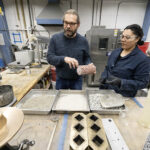Advancements in electric vehicle battery packs, lithium extraction methods and cancer treatment are among the projects funded through the UWM Research Foundation’s Catalyst Grant program this year.
The program, supported by the Lynde and Harry Bradley Foundation and Clarios, has awarded a total of $180,000 to promising research and development in areas where UWM has the greatest potential to impact the regional economy through commercialization activities.
Now in its 16th year, the Catalyst Grant program has awarded over $5.76 million in seed funding for 109 projects. These projects have led to 62 issued patents, 30 license/option agreements and more than $36.5 million in follow-on investments in UWM technologies.
The award winners include:
Brian Armstrong and Deyang Qu (engineering): The researchers are developing a technology that will reduce fire risk in electric vehicles and other applications that use lithium-ion batteries. In addition to enhanced battery safety, the combined system reduces the number of switches and wiring needed for manufacture, allowing a reduction in the battery’s size.
Xiaohua Peng and Alexander Arnold (chemistry): Chemotherapy treatment for cancer causes multiple side effects because it does not distinguish between malignant cells and healthy ones. Peng’s group has designed patented cancer prodrugs, which are compounds selectively activated by conditions that are unique to the tumor microenvironment. She has recently observed synergistic effects with her compounds combined with high-dose vitamin C in triple-negative breast cancer cells.
Ionel Popa (physics): Popa has developed technology for more efficiently capturing and concentrating antibodies that are useful in a wide range of research and therapeutic applications. This patent-pending material consists of protein-based hydrogels that offer a high density of antibody binding sites and increased yield over current purification methods.
Yin Wang and Xiaoli Ma (engineering) and Shangping Xu (geosciences): This project has the potential to make the U.S. a bigger player in providing lithium to meet the exploding global demand for lithium-ion batteries. This extraction method takes brine solution from natural resources or waste from the oil and gas industry, filters it to remove contaminants, and selectively captures lithium with novel adsorbents. The method improves upon current technology.





